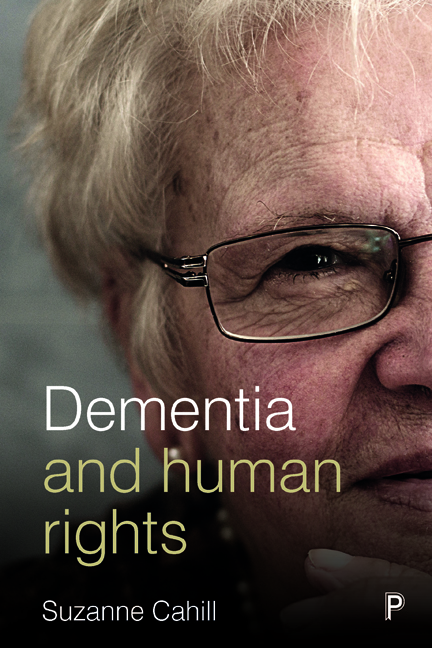two - Dementia as a disability
Published online by Cambridge University Press: 22 April 2022
Summary
Introduction
In Chapter One, the topic of human rights and dementia was introduced, and it was shown that dementia is a human rights issue since the individual diagnosed can experience injustice, inequality and marginalization. As I argue in later chapters, once diagnosed a person may encounter discrimination, segregation and social exclusion (Cantley and Bowes, 2004), their autonomy can be compromised (Boyle, 2008), and opportunities to exercise choice and control in decisions directly relevant to their lives may be denied (Nuffield Council on Bioethics, 2009; Hughes, 2011). The individual may also be subjected to other injustices (Post, 2000; Bartlett, 2016), including prejudicial and stereotypical attitudes (Bartlett and O’Connor, 2010; Dupuis et al, 2016) and to unhelpful, and at times, harmful, interventions (Banerjee, 2009).
Apart from being a human rights issue, dementia can also be framed as a disability (Kitwood, 1993a, 1997a; Bartlett, 2000; Beattie et al, 2005; Gilliard et al, 2005; Marshall, 2005; Dorenlot, 2005; Thomas and Milligan, 2015; Mental Health Foundation, 2015; Hare, 2016; Shakespeare et al, 2017), although the inclusion of dementia in disability studies and conversely, the integration of the concepts and tools generated by disability scholars into dementia studies, has been slow to evolve (Shakespeare et al, 2017). Indeed, at a recent conference (Mittler, 2016b), an academic, who has self-identified as having both dementia and a disability, commented on this same disconnect when he said: “Dementia and disability seem like planets spinning on different axes, their inhabitants aware of each other's existence but apparently unable to communicate. There is a perception in the disability world that dementia is solely a health responsibility. People with dementia do not necessarily think of themselves as disabled.” This disconnection reflects missed opportunities since contextualizing dementia as a disability can, as I will argue in this chapter, yield benefit.
This chapter draws on the extant literature, especially critical writings from disability studies, to re-examine dementia from a disability perspective, and to demonstrate the unique challenges that confront self-advocates who have dementia, when campaigning for their rights. Using tools derived from disability studies, a secondary aim of the chapter is to build on different models of disability to provide a compelling argument as to why dementia should be framed as a disability, and to outline the opportunities available to the dementia community by placing dementia under a disability lens.
- Type
- Chapter
- Information
- Dementia and Human Rights , pp. 27 - 46Publisher: Bristol University PressPrint publication year: 2018

